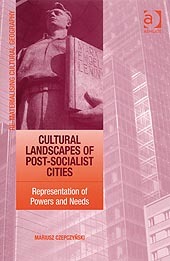Description
Cultural Landscapes of Post-Socialist Cities
Representation of Powers and Needs
Author: Czepczynski Mariusz
Language: English
Subjects for Cultural Landscapes of Post-Socialist Cities:
Keywords
West Germany; National Library; Post-socialist Landscape; Usti Nad Labem; European Landscape Convention; Cultural Landscape; Post-Socialist Cities; Conservative Researchers; Nowa Huta; Social Reproduction; Communist Icons; Cultural Landscape Research; Shock Therapy; Cultural Landscape Studies; Heritage Landscape; Central European Cities; Egalitarian Parity; Statue Park; Natural Stone Walls; Pre-liminal Phase; Socialist Cities; Landscape Studies; Landscape Transformations; Post-socialist Countries; MIEP
Approximative price 177.01 €
Subject to availability at the publisher.
Add to cartPublication date: 06-2008
Support: Print on demand
Approximative price 64.97 €
In Print (Delivery period: 14 days).
Add to cartPublication date: 11-2016
· 15.6x23.4 cm · Paperback
Description
/li>Contents
/li>Biography
/li>




